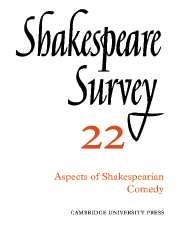Book contents
- Frontmatter
- Old and New Comedy
- An Approach to Shakespearian Comedy
- Shakespeare, Molière, and the Comedy of Ambiguity
- Comic Structure and Tonal Manipulation in Shakespeare and Some Modern Plays
- Laughing with the Audience: ‘The Two Gentlemen of Verona’ and the Popular Tradition
- Shakespearian and Jonsonian Comedy
- Two Magian Comedies: ‘The Tempest’ and ‘The Alchemist’
- ‘Thou that beget’st him that did thee beget’: Transformation in ‘Pericles’ and ‘The Winter’s Tale’
- The Words of Mercury
- Why Does it End Well? Helena, Bertram, and The Sonnets
- Some Dramatic Techniques in ‘The Winter’s Tale’
- Clemency, Will, and Just Cause in ‘Julius Caesar’
- Thomas Bull and other ‘English Instrumentalists’ in Denmark in the 1580s
- Shakespeare in the Early Sydney Theatre
- The Reason Why: The Royal Shakespeare Season 1968
- The Year's Contributions to Shakespearian Study 1 Critical Studies
- 2 Shakespeare’s Life, Times and Stage
- 3 Textual Studies
- Index
- Plate Section
Shakespearian and Jonsonian Comedy
Published online by Cambridge University Press: 28 March 2007
- Frontmatter
- Old and New Comedy
- An Approach to Shakespearian Comedy
- Shakespeare, Molière, and the Comedy of Ambiguity
- Comic Structure and Tonal Manipulation in Shakespeare and Some Modern Plays
- Laughing with the Audience: ‘The Two Gentlemen of Verona’ and the Popular Tradition
- Shakespearian and Jonsonian Comedy
- Two Magian Comedies: ‘The Tempest’ and ‘The Alchemist’
- ‘Thou that beget’st him that did thee beget’: Transformation in ‘Pericles’ and ‘The Winter’s Tale’
- The Words of Mercury
- Why Does it End Well? Helena, Bertram, and The Sonnets
- Some Dramatic Techniques in ‘The Winter’s Tale’
- Clemency, Will, and Just Cause in ‘Julius Caesar’
- Thomas Bull and other ‘English Instrumentalists’ in Denmark in the 1580s
- Shakespeare in the Early Sydney Theatre
- The Reason Why: The Royal Shakespeare Season 1968
- The Year's Contributions to Shakespearian Study 1 Critical Studies
- 2 Shakespeare’s Life, Times and Stage
- 3 Textual Studies
- Index
- Plate Section
Summary
We can view Shakespeare and Jonson either as the twin pillars of Elizabethan comedy or as its opposite poles: one romantic, positive and attractive; the other satiric, negative and (now and then) repelling. If we take the latter view, it is partly because Jonson indicated his contempt for the absurdities of Shakespeare’s romantic fables. Instead of improbable fictions like Pericles, he offered to his audiences the comic truth in ‘deeds and language such as men do use’. In his plays the audiences were to find ‘an image of the times’, a living record of their affectations and follies. Jonson’s determination to strike out on a new path of satiric realistic comedy was, no doubt, inevitable and right. But in deliberately rejecting the earlier romantic mode of comedy, Jonson, I suspect, denied something of his own genius, for there is in his earliest masterpiece, Every Man in His Humour, a sweetness and amiableness of temper not to be found again in his art. The point of view, if not the subject matter, of Every Man in His Humour is almost Shakespearian. Here, near the start of his career, was a tolerant amused acceptance of humours that blunts the edge of corrective satire. Contemptuous as he was of romantic fabling, Jonson had, moreover, an instinct for romantic variety and multiplicity which, though severely disciplined in Volpone and The Alchemist, burst forth in the noisy carnivals of Epicene and Bartholomew Fair. The maker of elegant courtly masques fashioned his comedies out of the coarse and common stuff of Elizabethan life, that Shakespeare preferred to ignore or varnish.
- Type
- Chapter
- Information
- Shakespeare Survey , pp. 43 - 46Publisher: Cambridge University PressPrint publication year: 1970

